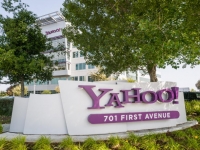The deal -- specifics of which are still unclear -- seems to outsource Yahoo's local search efforts to Yelp. In the past, Yahoo has had its internal teams get local business information from third-party feeds and clean up the data to incorporate it into Yahoo's search results.
The licensing-deal route is a familiar one for Yahoo. CEO Marissa Mayer had previously called Yahoo a very friendly company, open to partnerships where its proprietary technology has fallen short. The company's most high-profile partnership -- though it's notable that it was struck before Mayer's tenure -- is a 10-year search partnership with Microsoft's Bing, in which Redmond takes care of the Web-crawling capabilities at Yahoo.com.
Yahoo's feelings toward the Microsoft deal are enigmatic. Mayer has in the past expressed her dissatisfaction for the deal, yet it brings in a good chunk of search revenue, at 31 percent. Yahoo could get out of the deal as early as 2015, if it can prove that the deal hasn't lived up to certain financial expectations. And there have been reports that Yahoo wants to get back to its roots by developing core technology in algorithmic search and search technology.
The Journal said the Yelp-incorporated results will launch in the next couple of weeks. This is in line reported in December, that Yahoo was making an active play in structured search. We wrote:
The company is focusing on "structured search" to try to make search results sizzle -- that is, results that usually come from brand and content partners, and are displayed with more pizzazz and information. (A general example is searching for, say, "flight to London," and having a rate table or calendar pop up for trip dates.)
So the really interesting bit of the Yahoo-Yelp deal is how it could fit into the future of a Yahoo search product with a renewed interest in structured search, with or without Microsoft. For example, if the Yahoo deal is anything like a deal Yelp already has with Microsoft's Bing, if you search for a particular restaurant, you automatically have Yelp reviews and photos at the ready. Finding a way to dress up and personalize those results even more -- especially on mobile -- would be a nice touch from Yahoo. That type of move has Mayer's fingerprints all over it. Mayer has said before that user interface would be a distinguishing facet of Yahoo search, and Yelp results give the company a potent trove of content to draw from (not to mention try to monetize). And when she was at Google, she had tried to get the company to buy Yelp.
In any case, Yahoo's deal with Yelp was long overdue. "Yahoo needed to do this investment a long time ago. The platform was just rotting," said a former member of Yahoo's local search team.
He said that local search in the US market was barely keeping up, and that international efforts were largely ignored. What's worse, the local-search technology itself had differed from global market to market, making it difficult to to execute on plans. Like many of Yahoo's woes, it was mainly a legacy problem: The platform for the, say, Korean market would be different from the platform for the US market, because of the siloed way those platforms evolved separately from each other.
Asked to estimate what a possible revenue share could be, the former Yahoo employee posited that it would be heavily in favor of Yelp, since it comes into the situation with more power thanks to the company's elevated cachet, helped by licensing deals with Microsoft, mentioned above, and Apple, which uses its content in Apple Maps. The person, who had knowledge of past Yahoo revenue share deals, guessed that the agreement could be lopsided to the tune of 70 percent Yelp, 30 percent Yahoo.
Yahoo decline to comment on the reported partnership. Financial terms, of course, have not been reported. But whatever they are, for Yahoo, it's worth it.

